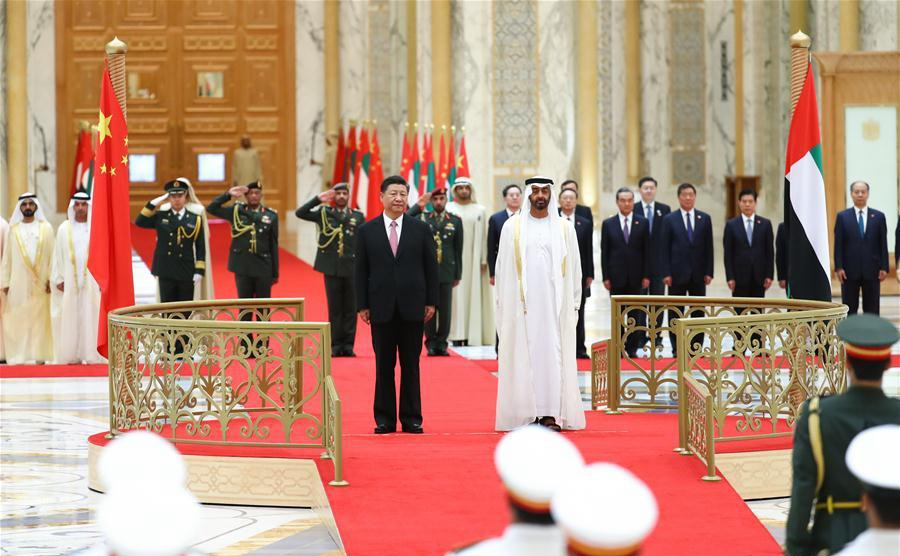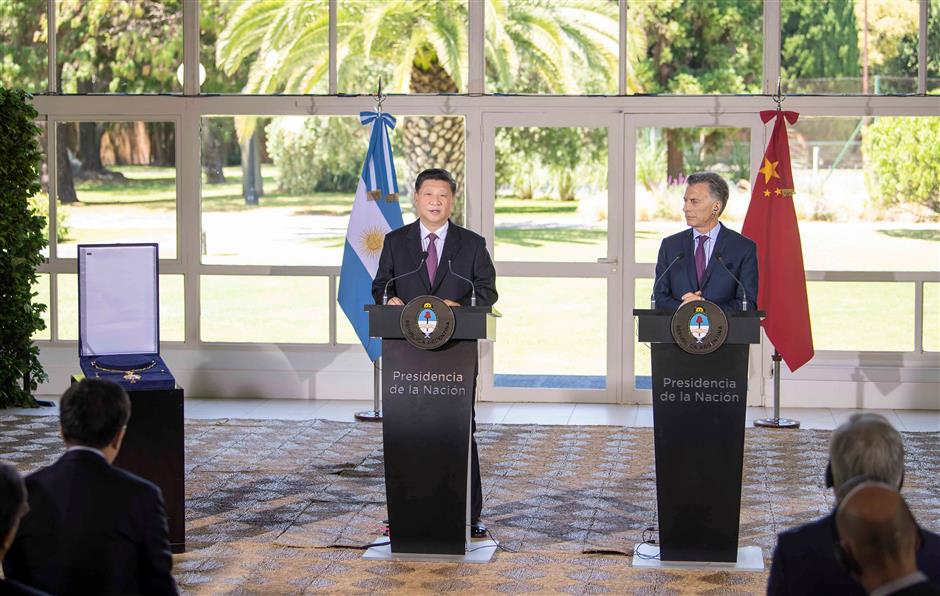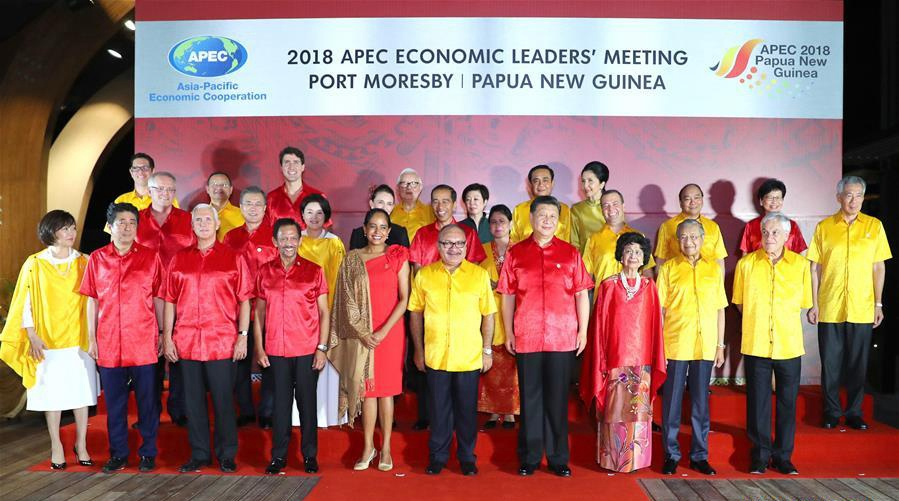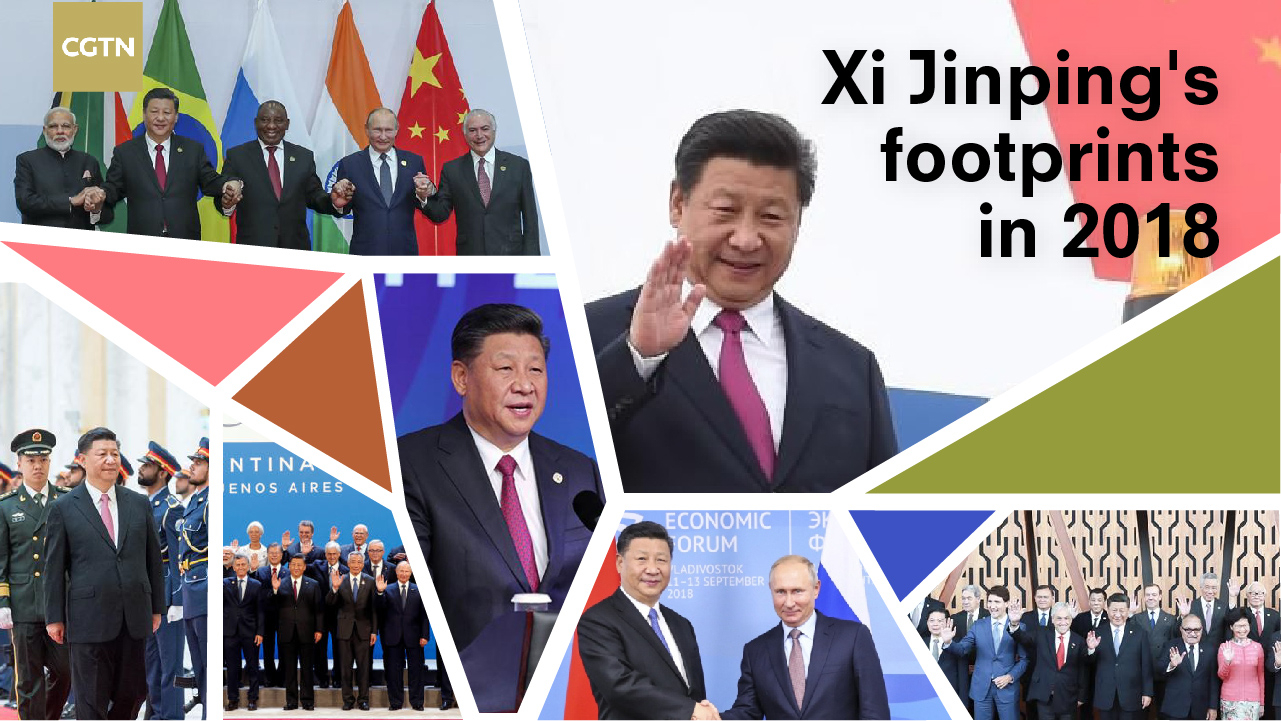The world in 2018 was marked by uncertainty. This year has seen a shift in the balance of power, a continuation of the regressive trend in Western politics and the escalation in major-country competition. Multilateralism and the old international order have come under unprecedented threats. It is under these trying circumstances that Chinese President Xi Jinping has charted a new path for China's major-country diplomacy.
Since his re-election as Chinese president in March this year, Xi has visited 13 countries across four continents and attended three major international summits abroad.
Projecting strength and confidence on the international stage, President Xi has reaffirmed China's steadfast support for economic globalization, multilateralism, free trade and opening-up. 2018 was the year China built new partnerships, reinvigorated old ones and ushered in hope in a turbulent world.

A timeline of President Xi Jinping's overseas trips in 2018. /CGTN Photo
A timeline of President Xi Jinping's overseas trips in 2018. /CGTN Photo
A growing circle of friends
China expanded its outreach to countries in Africa, Asia Pacific and Latin America in 2018 and fostered sound momentum toward shared prosperity.

Chinese President Xi Jinping begins his first overseas trip this year in Abu Dhabi, UAE, where he attends a grand welcome ceremony with Crown Prince of Abu Dhabi Sheikh Mohammed bin Zayed Al Nahyan, July 20, 2018. /Xinhua Photo
Chinese President Xi Jinping begins his first overseas trip this year in Abu Dhabi, UAE, where he attends a grand welcome ceremony with Crown Prince of Abu Dhabi Sheikh Mohammed bin Zayed Al Nahyan, July 20, 2018. /Xinhua Photo
The highlight this year was win-win cooperation, particularly between China and other developing countries. As Chinese State Councilor and Foreign Minister Wang Yi put it, 2018 has been "the year of South-South cooperation in China's foreign relations."
President Xi has always attached great importance to China-Africa ties. He visited Africa on his first overseas trip, both after he was elected as Chinese president in 2013 and after his re-election in 2018.
During his visits, Xi and African leaders witnessed the signing of some 40 cooperation documents. Both Senegal and Rwanda signed Memorandums of Understanding on implementing the Belt and Road Initiative (BRI) with China. Senegal was also the first West African country to sign a BRI cooperation document with China.
In Papua New Guinea, Xi met with leaders of Pacific island states that have established diplomatic relations with China, agreeing respectively to jointly build the Belt and Road.
Xi's trips to Argentina and Panama at the end of the year opened up broad prospects for China's relations with Latin American countries. As China's old friend and new partners in the region, both countries warmly embraced China's BRI as a boost to their own development strategies.

Chinese President Xi Jinping receives Argentina's highest decoration, the Order of the Liberator General San Martin, from President Mauricio Macri in Buenos Aires, Argentina, December 2, 2018. /Xinhua Photo
Chinese President Xi Jinping receives Argentina's highest decoration, the Order of the Liberator General San Martin, from President Mauricio Macri in Buenos Aires, Argentina, December 2, 2018. /Xinhua Photo
It is also worth mentioning that China and Panama have already witnessed mutual visits by their heads of state just two years after the two countries established diplomatic relations.
The BRI, which was proposed by Xi in 2013, has entered a phase of solid growth this year and is now the world's biggest cooperation platform, with trade between China and BRI partner countries exceeding six trillion U.S. dollars.
Notable firsts in 2018:
UAE was the first Arab country Xi visited after his re-election as Chinese president.
The first visit to Rwanda by Xi Jinping was also the first ever by a Chinese president.
Senegal was the first West African country Xi visited as Chinese president.
Xi attended the Eastern Economic Forum for the first time in Vladivostok, Russia.
The first visit to Papua New Guinea by Xi Jinping and the first ever by a Chinese president.
The first visit to Brunei by Xi Jinping.
The first visit to the Philippines by Xi Jinping as Chinese president.
The first visit to Spain by Xi Jinping as Chinese president.
The first visit to Panama by Xi Jinping and the first ever by a Chinese president.
The first visit to Portugal by Xi Jinping as Chinese president.
Building a community with a shared future for mankind
Facing the headwinds of protectionism and unilateralism, President Xi championed multilateralism and reiterated China's commitment to opening-up and promoting global prosperity at each of the major events he attended.
At the BRICS Johannesburg Summit in South Africa, Xi urged emerging-market countries to uphold multilateralism, oppose trade protectionism and together usher in another "Golden Decade" of BRICS cooperation with innovation at its core. He spoke highly of BRICS cooperation for being a departure from the traditional political and military alliances along ideological lines, and a new model for international relations that rises above zero-sum thinking.
During the Asia-Pacific Economic Cooperation (APEC) Economic Leaders' Meeting in Papua New Guinea, Xi called for the group's continued commitment to openness and inclusive development, while pledging more support for smaller developing countries in the region. He pointed out that "might-is-right" is no longer the way of the international order, and "confrontation – whether in the form of a cold war, hot war or trade war – will produce no winners."

Chinese President Xi Jinping (4th R, front) poses for a group photo with leaders and representatives attending the 26th APEC Economic Leaders' Meeting and their spouses in Port Moresby, Papua New Guinea, November 17, 2018. /Xinhua Photo
Chinese President Xi Jinping (4th R, front) poses for a group photo with leaders and representatives attending the 26th APEC Economic Leaders' Meeting and their spouses in Port Moresby, Papua New Guinea, November 17, 2018. /Xinhua Photo
This year marks the 10th anniversary of the 2008 financial crisis and the establishment of the G20 summit mechanism. Addressing the 13th G20 summit in Buenos Aires, Xi reminded world leaders that the global economy is again at a crossroads where crises and hopes exist side by side. He put forward a four-point proposal on global economic governance, urging the G20 to stick to openness, partnership, innovation and inclusiveness and steer the world economy in the right direction.
The optimism and resolution expressed by the Chinese president sent the right message to the world and helped facilitate a consensus at the Buenos Aires summit on safeguarding the international trade system and reforms of the World Trade Organization (WTO).
Meanwhile, Xi called on the G20 to "inject political impetus into international cooperation on jointly tackling climate change," as China has stepped forward into a leading role in implementing the Paris Agreement.
Major-country relations on the sidelines
China's relations with Russia are at their historic best.
"Since the beginning of this year, China-Russia relations have shown a more positive development momentum and entered a new era of faster and higher-level development," Xi said while meeting with his Russian counterpart Vladimir Putin in Vladivostok on the sidelines of the 4th Eastern Economic Forum (EEF). Continuing a tradition of China and Russia supporting each other to host large-scale multilateral events, Xi's first-time attendance at the EEF has rich meanings and far-reaching impact.
The China-Russia bond, deepened by frequent high-level exchanges, is not only a mutually beneficial partnership serving the interests of both countries and peoples, but also a strong stabilizing force for regional peace and strategic balance in the world.
China-U.S. relations have been at the center of global economic uncertainty in 2018. The world's two biggest economies have been embroiled in a trade war that sent bilateral relations on a wild ride throughout most of the year.
The highly-anticipated meeting between President Xi Jinping and his U.S. counterpart Donald Trump on the sidelines of the G20 summit captured eyes around the world. And as the world watched, the two leaders agreed to stop imposing new additional tariffs on each other. The positive outcomes from the Xi-Trump meeting showed once again that both China and the U.S. have more to gain in cooperation than in conflict, and their common interests will ultimately outweigh differences.

Chinese President Xi Jinping and U.S. President Donald Trump meet for the first time this year in Buenos Aires, Argentina, December 1, 2018. /Xinhua Photo
Chinese President Xi Jinping and U.S. President Donald Trump meet for the first time this year in Buenos Aires, Argentina, December 1, 2018. /Xinhua Photo
Xi's overseas visits in 2018 have added much needed stability and positive energy to a world undergoing profound changes, demonstrating the vision and sense of responsibility of a major country's leadership. In turn, his visits were met with exceptional hospitality and decorations of the highest prestige from some of the host nations.
As China takes on greater responsibility in global affairs, more difficulties and challenges will ensue. No matter how the international situation may change, China's direction under the leadership of President Xi Jinping, consistent with the principles of multilateralism, equal partnership, win-win cooperation and shared prosperity, is in line with the trend of the times.
(Graphics by Hu Cong, Du Chenxin)







